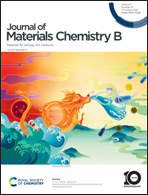An ultra pH-responsive peptide nanocarrier for cancer gene therapy†
Abstract
The tumor microenvironment is a very complex and dynamic ecosystem. Although a variety of pH-responsive peptides have been reported to deliver nucleic acid drugs for cancer treatment, these responses typically only target the acidic microenvironment of the tumor or the lysosome, and the carrier suffers from issues such as low transfection efficiency and poor lysosomal escape within the cell. To address this problem, we have developed an ultra pH-responsive peptide nanocarrier that can efficiently deliver siRNA, pDNA, and mRNA into cancer cells by performing progressive dynamic assembly in response to pH changes in the acidic tumor microenvironment (pH 6.5–6.8) and the acidic intracellular lysosomal environment (pH 5.0–6.0). The maximum transfection efficiency was 87.1% for pDNA and 74.9% for mRNA, which is higher than that of peptide-based nanocarrier reported to date. In addition, the targeting sequence on the surface allows the peptide@siRNA complex to efficiently enter cancer cells, causing 96% of cancer cell mortality. The carrier has high biocompatibility and low cytotoxicity, making it highly promising for application in immunotherapy and gene therapy of tumors.



 Please wait while we load your content...
Please wait while we load your content...